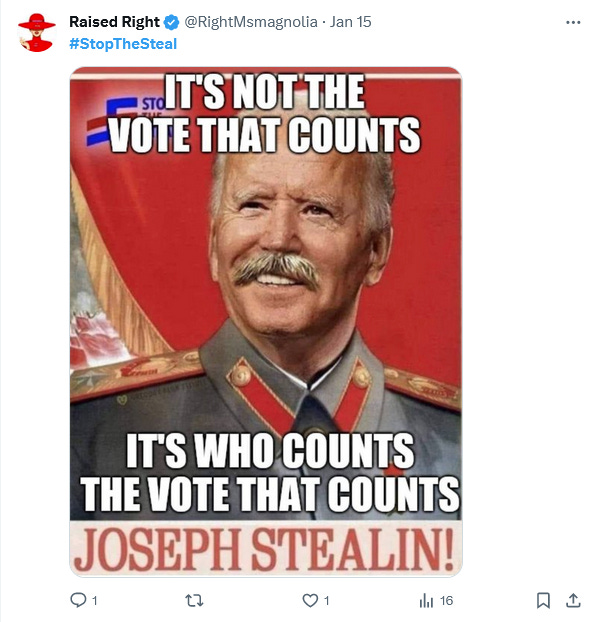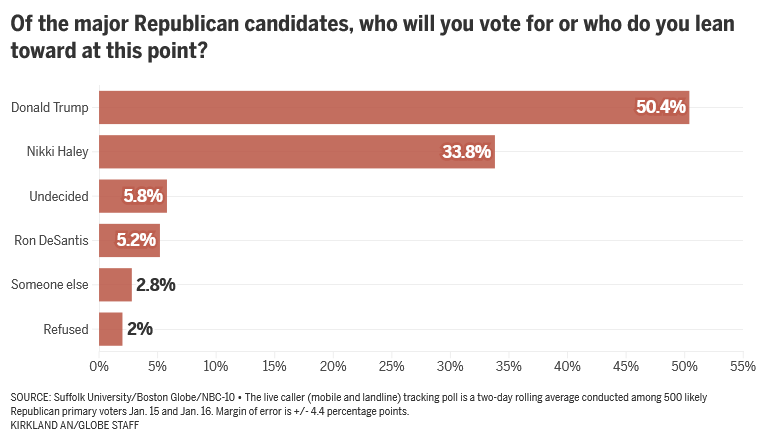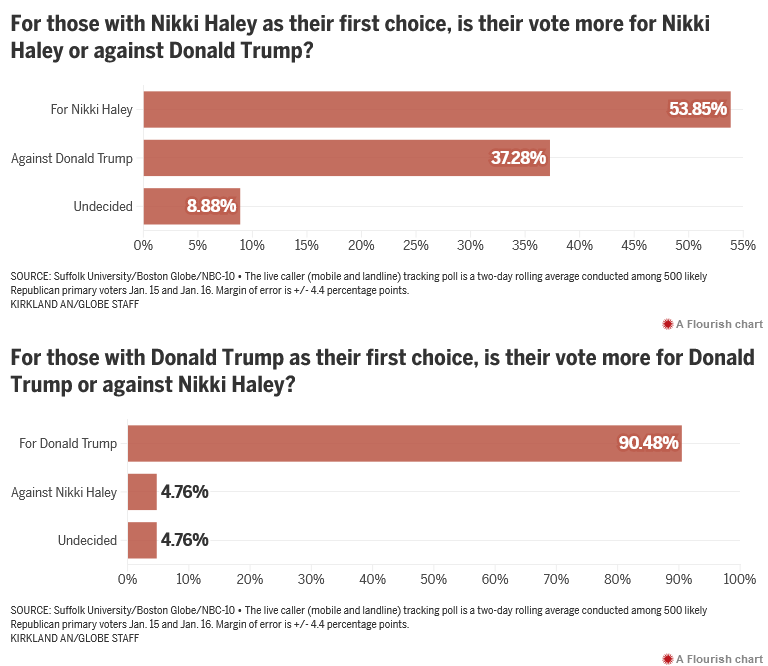Reality Check: Political Parties Are What's Wrong With Our Politics
When Tactics Matter More Than Values In Politics, We've Lost Our Way
I was reluctant to start writing about American politics, and even now am not entirely comfortable writing articles that fit under the “Politics Matter” section of this Substack. That was true when I set up the section and it remains true today.
As a general rule, I prefer to avoid weighing in on political debates within this Substack. While I have my opinions (and am quite willing to voice them in discussions via Notes and elsewhere), I prefer to keep my formal content focused on areas where there is considerable factual material for analysis.
However, I am from time to time confronted by commentaries which challenge not just a factual reading of political issues but also of the core values that I strive to exemplify within All Facts Matter: freedom of speech, freedom of thought, and above all respect for individual opinions and perspectives.
Such a commentary appears in Matthew Yglesias recent article on his Slow Boring Substack. His thesis is that democratic process needs political parties in order to function, because voters can’t sort things out for themselves.
The voters are like a child whose parents don’t enforce a bedtime — he is superficially getting what he wants, but in practice, he’s cranky and upset all the time. Most people don’t actually want to sift through the ranks of random governors and senators, identify which ones suit the moment, go volunteer for their campaigns, give them money, etc. What they want is strong parties to do that work and present them with appealing nominees. Instead, everyone is miserable, and it risks discrediting democracy.
Matthew Yglesias might think voters are juveniles in need of the firm parental hand of political parties, but I do not.
I freely admit that I do not have any particular insight into what people “want”. Most days I’m doing well if I can figure out what topics are going to be well received by readers of my own Substack! While I have a full measure of ego and pride about my work, my arrogance does not stretch nearly as far as Matthew Yglesias’, to where I believe I can divine what voters really “want”.
That said, I do believe that, whatever voters desire overall in this country, political parties—Democratic, Republican, Libertarian, Green, or even the protean “No Labels” non-party—are generally atrocious at delivering what voters desire.
Borrowing from Ronald Reagan’s observation about government in his 1981 inaugural address1, I submit that political parties are not the solution to what ails the Republic, but are instead the core of the problem.
Do “most” voters want to donate time and money to their preferred political candidates? Probably not. Are most voters thoroughly enamored of the leading political candidates in any election cycle? Probably not.
Are voters “miserable” because of this? I’m not so sure. My own personal assessment of the GOP candidates for President is ultimately that Donald Trump is the best of a flawed group of candidates. No, I am not a fan of Donald Trump, and I don’t shy away from saying so even as I write in his defense against Jack Smith’s illegal and unconstitutional persecution of him.
Full disclosure: I am not particularly a fan of Donald Trump.
I was less than impressed during the 2016 election over the Billy Bush tape episode.
I’m frankly not too impressed with the entire “classified documents” nonsense.
I consider him to be directly responsible for allowing the Pandemic Panic Narrative to run amok in this country in 2020, directly leading to a recession, massive violations of civil liberties and Constitutional rights across the country. His “Operation Warp Speed” gifted the world with the toxic and deadly mRNA inoculations which are demonstrably worthless against the SARS-CoV-2 virus while wreaking as yet unknown levels of damage on the human body.
I am far from enthusiastic about the prospects of a second Donald Trump Administration in the Oval Office.
Does this make me “miserable”? I certainly do not consider myself to be miserable, nor am I even particularly frustrated by the lack of better candidates on the Republican side of things.
Quite the contrary, I am intrigued by Robert F. Kennedy, Jr. and his likely quixotic hunt for the Presidency as an independent candidate. I am not sure I support his policies or his agenda items, but he is a worthy candidate who is not undeserving of far greater attention than he has gotten from the corporate media.
I am fascinated by “No Labels” and their plan on building a Presidential ticket and platform that cuts across party lines.
Do I expect either independent candidates like RFK, Jr., or third parties such as “No Labels” (which is, ultimately, a centrist political party regardless of how it presents itself) to at present sway the 2024 election in one direction or the other? No. As I observed the other day, for such efforts to be impactful, they need to secure access to the ballot in all 50 states, and so far they have not done so.
Do I expect others to share my nerdy enthusiasm for the details of political campaigning and the logistical hurdles which exist in presenting a political campaign so 330 million Americans all at once? Not necessarily, although I’m sure there are many who do.
I am equally sure there are many who are frustrated because they are certain that rampant fraud and corruption are the reason Donald Trump “lost” to Joe Biden. One only has to get on any social media platform to see this displayed prominently.
On X/Twitter, for example, a search of the top tweets with the hashtag “#stopthesteal” brings up this tweet from just a few days ago:
As I write this, other tweets with that hashtag are appearing, some of which link to right-leaning, “conservative” publications which argue problems with states’ electoral processes and the crisis of confidence those problems potentially engender.
This particular tweet links back to an article from December in The Federalist, which discusses a Wisconsin lawmaker’s concern over a bit of legislation addressing the counting of absentee ballots in that state.
While proponents of a Wisconsin absentee ballot processing bill hail it as a cure for long delays in election night vote counting, the measure would sacrifice security for speed, a Wisconsin state election integrity hawk asserts.
State Rep. Janel Brandtjen, R-Menomonee Falls, says Senate Bill 685, which would allow local election clerks to begin processing absentee ballots the day before an election, has been painted as a bipartisan panacea to a problem that has particularly plagued election nights in Milwaukee: slow vote returns.
“The idea that’s being presented is not truthful,” Brandtjen said. “This bill trades speed for security. It will lead to many more central counts in the state of Wisconsin, with almost no chain of custody on those ballots.”
If we take Janel Brandtjen’s concerns at face value, even if just for the sake of argument, what we have is a soberly and seriously presented concern about the integrity of absentee ballots. One need not be either “conservative”, “Republican”, or “Trump supporter” to want to see absentee and other ballots handled properly with a documented chain of custody as a bar against vote tampering.
Surely it is not unreasonable to impute to a tweet linking to this article a similar concern. The hashtag “#StopTheSteal” alone indicates a measure of voter dissatisfaction and concern over the ballot procedures currently in place.
As a study by the Heritage Foundation demonstrates, despite the protestations by many that there is no “provable” evidence of voter fraud in the 2020 election, the reality since 2020 is that there have been over 1,400 instances of voter and election fraud.
Despite such evidences—which it must be emphasized document proven instances of voter fraud—many politicians dismiss concerns over ballot and election integrity.
In a June 2023 Congressional hearing, Rep. Joe Morelli (D-N.Y.) called Republican members’ attitudes about widespread voter fraud “cynical” and the series of election integrity hearings they were conducting in the House “tedious” and “redundant.”
Mr. Morelli said Republicans are fixated on an “unproven lack of integrity” that they claim exists.
“Uproven lack of integrity”? 1400 proven instances of voter fraud and counting is not proof of a certain lack of integrity within at least some states’ election processes?
To the contrary, while the Heritage Foundation data is not by itself dispositive in adjudicating a claim of fraud in the 2020 election, that data does call attention to potentially severe flaws in our electoral processes, flaws which could foster (and arguably have fostered) a crisis of confidence in this country’s elections.
If the airing of such concerns is, as Matthew Yglesias appears to argue, a sign of voters being “miserable”, should we not ponder what sort of person would not be upset if our ballots and voting processes could not be trusted? Should we not step back and consider the counterfactual to Congressman Morelli’s dismissal of these concerns as “unproven”—that in fact Republicans are right about voter fraud, and that real problems exist across the country?
Indeed, that counterfactual calls attention to a major weakness in Jack Smith’s indictment against Donald Trump for, among other things, fraud—what if Donald Trump’s claims of rampant fraud in the 2020 election are correct?
The core of Smith’s case was that Trump made “knowingly false” claims about the 2020 election, and thus attempted to defraud the United States and obstruct the certification of the actual election itself.
But what if Trump’s claims are true? What if Trump’s claims of ballot fraud and election corruption are on the money? How could Donald Trump be even attempting to defraud anyone simply by telling the truth?
Why wouldn’t voters be frustrated and upset if such concerns were being airily dismissed by the professional political class, as typified by Congressman Morelli?
If we look at the upcoming Republican Presidential Primary in New Hampshire, we see evidence not of voter frustration but voter enthusiasm. While Donald Trump has a commanding lead in the pre-election polling, with more than 50% support from New Hampshire voters, Nikki Haley also has a not insignificant base of support.
At the same time, Ron DeSantis is the second choice for roughly 30% of New Hampshire Republicans.
Most tellingly, however, is that for the two leading candidates, Trump and Haley, their supporters are mostly voting for the respective candidate and not against the other.
New Hampshire voters, at least, want to vote for their declared candidate. That’s not a sign of voter misery. Quite the opposite.
That is not to say that voters are not deeply troubled by the state of affairs within this country. For over 10 years more Americans than not believe this country is headed in a wrong direction.
It will no doubt discomfit Matthew Yglesias to realize that Donald Trump’s first term in the Oval Office was the sustained period of the least amount of voter dissatisfaction with the general trend of things in this country. Neither Obama nor Biden governed nearly as well, based on this particular metric of voter sentiment.
At the same time, Congressional job approval has been negative for at least as long as sentiments on the direction of the country.
Tellingly, the spread on Congress’ job approval numbers was widest during the Obama years—the years Yglesias identifies as when the Democrats in particular could “make decisions.” Apparently, the decisions the Congressional Democrats made were not all that well received by the voters.
This lack of Congressional job approval and the persistent negative assessment of the direction this country is going are pretty strong arguments against Yglesias’ assessment of why voters are, in his words, “miserable.” Throughout years and years of the status quo, years when the political parties were by Yglesias’ own admission in much greater control over political discourse in this country, voters were demonstrably more “miserable” than they are now, when Yglesias argues that political parties have inadequate control over political discourse.
What Matthew Yglesias cannot acknowledge, apparently, is that voters not only do not need either the Democratic or Republican Party to do their political thinking for them, there is not much evidence they want the parties to do that. Yglesias’ assessment that voters “really” want the parties to sort out candidates and policies and legislation for them is not at all supported by even a generous reading of the data we have on voter sentiment.
I certainly haven’t seen any tweets on X/Twitter, or any posts on LinkedIn, bemoaning a lack of clear guidance by the political parties—no one is asking either the Democrats or the Republicans “please, tell me how I should vote!” That’s not a question that is being asked on social media. There are plenty of trigglypuffs eager to tell other people how everyone should vote, but no one is actively soliciting that guidance.
What we do see on X/Twitter in particular is a number of tweets taking aim at what is called the “Uniparty”, the premise that both Democrats and Republicans are in reality merely different heads of the same corrupt political Hydra. That suspicion appears throughout political topics on X/Twitter, such as Congressional efforts to fund both border security and Ukraine’s war effort against Russia.
Many voters are upset that Dementia Joe has not been impeached for what many believe to be his blatant and shameless corruption involving his son’s “business interest” in Ukraine and elsewhere. They blame Republicans and Democrats alike.
A search of LinkedIn posts for the hashtag #uniparty reveals a similar level of interest in that particular narrative.
Voters are indeed dissatisfied…but they are dissatisfied with the political parties we have in this country, not those parties’ feckless tolerance of voter preference and voter independence.
Both polling data going back over ten years and the anecdotal evidences of social media all point to the same assessment of politics in this country: the problem is the political parties.
Democrats and Republicans together have spent their way into a $34 Trillion national debt. Democrats and Republicans have together involved this country in countless illegal foreign wars. Democrats and Republicans, both in the Oval Office and in Congress, have blatantly ignored the mandates of the United States Constitution, the Supreme Law of the United States which all Presidents, Vice Presidents, and members of both Houses of Congress take an oath or affimation to uphold.
Moreover, this is not at all a new phenomenon. It was quite evident even during Trump’s first term of office and before that those whom we elect to high office routinely disregard the laws that are meant to constrain government and preserve our liberty.
The professional political class Yglesias would lionize has done this. Political parties have done this. Voters have not done this.
Were it not for political parties, Robert F. Kennedy, Jr., would not have had the roadblocks thrown in his way to preserve Dementia Joe as the anointed Democratic nominee for 2024. Were it not for political parties, it would be far less credible to consider the possibility of massive and coordinated multi-state voter fraud to secure Dementia Joe’s 2020 victory over Donald Trump.
Were it not for political parties, we would not have had to witness the spectacle of would-be GOP nominees battling each other for the privilege of coming in second in the GOP primaries to Donald Trump—a reality that was driven home the other day in the Iowa Caucuses.
If the GOP Establishment has been hoping for a viable alternative to Trump to emerge through the primaries, Iowa is proving a grave disappointment to them.
Not for nothing did George Washington, in his farewell address in 1796, caution the young Republic against the formation of political parties2:
One of the expedients of party to acquire influence within particular districts is to misrepresent the opinions and aims of other districts. You cannot shield yourselves too much against the jealousies and heartburnings which spring from these misrepresentations; they tend to render alien to each other those who ought to be bound together by fraternal affection.
At the foundation of my own political beliefs and personal philosophy lies a very determined belief in the ideals of libertarianism3. I trust individual people far more than I do groups, or bureaucracies, or political parties. I have my take on the issues that confront us—Ukraine, Israel-Hamas, China, the economy, COVID, et cetera—but I also have a hearty respect for the opinions and perspectives of others. If I write about something I am generally confident that I have done good research on the topic and have my facts and evidences in order, but I am happy to be challenged by others where I might have gotten something wrong.
For these reasons, I reject Matthew Yglesias’ call for more influential, more intrusive, more muscular political parties. I reject all such efforts to circumscribe voters’ choices and ability to make known their preferences. Ultimately, I take Washington’s caveat to heart and reject political parties.
The Constitution was written to put We The People in charge. Not We The Political Parties.
Reagan, R. W. Inaugural Address. 20 Jan. 1981, https://www.reaganfoundation.org/ronald-reagan/reagan-quotes-speeches/inaugural-address-2/.
Washington, G. George Washington’s Farewell Address (1796). 19 Sept. 1796, https://www.georgewashington.org/farewell-address.jsp.
Van Der Vossen, B. “Libertarianism.” Oxford Research Encylopedias, 2017, https://doi.org/10.1093/acrefore/9780190228637.013.86.



















While you cannot hold a federal poltician to a contract as to his or her performance, you can help educate other voters as to such person's voting record. The John Birch Society puts out scorecards on politicians' voting records based on the Constitutionality -- or lack thereof -- of the things for which they vote. Check out JBS.org for more, and I highly recommend the JBS.org's six-DVD series on "The Constitution Is the Solution."
One can argue that the rise of political parties from “communities of shared interests” is inevitable. Such communities tend to be self-organizing at first, as those with the time and energy take leadership roles and begin directing the attention and efforts of the community to achieve their shared objective.
One could also argue that the parties thus organized have fallen under the control of a self-appointed clique (the so-called “political elites”) that now delivers a set of objectives that they have chosen to the community they purport to represent. This also is inevitable - people in a position of authority inevitably begin to value their own opinion, and the opinions of those close to them, over the opinions of those in far-removed places.
Thus, the expectation of the voters that they can redirect the government through the agency of their respective political parties is foiled by their lack of control over those parties.
So step one in returning control of the government to “We the People” is for the voters to regain control of their political parties. Best way to do that is to replace all of the party leadership with people who are NOT members of the elite, starting at the local level and working up.